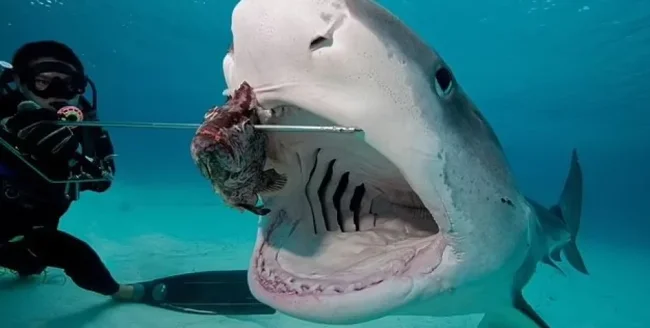The athlete tried to eat as much food as a tiger shark eats in one meal (4 photos + 1 video)
Extreme adventurer Ross Agile decided to enter into a competition with a creature that scientists call the “trash can” of the ocean. 
Extreme athlete Ross Edgley is known for his unusual experiments - he fights the most formidable predators on the planet on their territory. In the new release, he set himself an ambitious goal: a British researcher tried to imitate the diet of the tiger shark, which scientists consider the ocean's "garbage can" because it literally consumes everything in its path.
The researcher notes that the idea for the new experiment came to him while sailing off the coast of Great Britain. Ross was followed by a giant shark - it was just a plankton-eating tiger shark, which did not pose a threat to him, but its size was impressive. 
Sharks are one of the largest and most unique predators on the planet. They appeared on Earth about 420 million years ago and survived 4 of the 5 mass extinctions on the planet. In comparison, the human body is only 40-45% muscle, while a shark's body is an incredible 65% muscle. They also lack bones to slow them down, making it difficult to match their speed.
According to Ross, despite his desire, he is unlikely to ever achieve the speed that sharks are capable of, despite the fact that he has set several world records. However, the British extreme scientist believes that the amazing feeding habits of the tiger shark are actually the most difficult for humans to reproduce. 
It is known that tiger sharks can migrate thousands of kilometers without food, but then when they encounter a whale carcass or a turtle shell, they consume an incredible amount of calories at a time. Researchers have long compared the species to the "garbage cans" of the ocean, as they eat literally everything from crabs and venomous sea snakes to parts of sharks and other larger creatures.
Scientists have discovered that tiger sharks are able to absorb huge amounts of food at once - the food fills their stomach and even gets stuck in their throat until it is eventually digested. As a result, a huge portion is stored as fat in the liver, which is then used by sharks - thus the gaps between meals for sharks can be up to several months when traveling.
In a new experiment, Ross decided to reproduce the diet of sharks. To do this, he attempted to detoxify his body by fasting for 24 hours and using up the last of his body's resources by spending up to 16 hours in a thermal chamber in a laboratory at Loughborough University. Ross notes that during this period he was unable to sleep due to extreme hunger and the cramps that cramp your body due to lack of water and electrolytes.
After the fasting period ended, Ross ate as a tiger shark would. In the first phase, the researcher ate about 3,000 calories from sports drinks and smoothies. He then consumed about 7 liters of custard - Ross was dehydrated so this seemed like a great choice. 
Two 3,000-calorie cheesecakes followed, before Ross moved on to the main meal: a baguette wrapped in pizza and more. As a result, he managed to absorb an incredible 41,103 calories.
During the 24-hour feeding, the extreme weight gainer was 10 kg - thus, he made up for everything that he lost during fasting, and also gained an additional 12%. When time ran out, the researcher believed that he was close to the tiger shark's records, but later the researchers discovered that this was not the case at all.
According to shark expert Dr. Mike Heithaus, they conducted an experiment and found that in just one bite from a whale carcass, a tiger shark could get about 20,000 calories. So even though Ross managed to consume an incredible 40,000 calories, he didn't actually come close to eating a tiger shark's diet. Comparing their body weight to the number of calories they can eat in a day, Ross was able to eat about 28% of what a tiger shark can lay down.
What is interesting is that throughout the experiment, despite consuming an incredible 40,000 calories, Ross did not experience any digestive “complications.” The researchers found that all the food he ate during the day was simply digested—probably due to the fact that his body was literally exhausted at the beginning of the experiment.
Ross says that while fasting in the thermal chamber, his skin began to feel "paper thin" and his face became gaunt and sunken. The moment he started eating, it seemed to him that his muscles were “filling up like a sponge,” and this happened incredibly quickly.
The experiment may be strange and risky, but Ross believes there are some important scientific lessons to be learned from it. Firstly, in this way the researcher was able to attract public attention to the problems of the shark. Secondly, people can learn several sporting lessons from watching tiger sharks.























